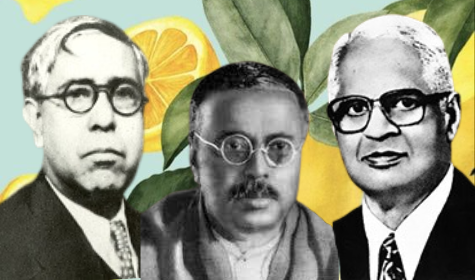To seek who is the father of Indian Psychology is problematic as the Internet argues several contenders for the position. In my previous article, I argued that questions like “Who is the Father of Indian Psychology?” or Who is the Mother of Indian Psychology? are problematic. A subject evolves, mutates, and branches out into new phenomena. There can be reputed or famous practitioners with respect to their initiation of query but to seek who is the father of Indian Psychology or world Psychology is limited. Nonetheless, in this article, I cover an overview of three people in India all of who have been argued to be the fathers of Indian Psychology. I just worry about what should a poor student write to the question in their academic exam.
The Father of Indian Psychology of Fathers of Indian Psychology
Narendra Nath Sen Gupta (1889–1944)
Narendra Nath Sen Gupta made significant contributions to the discipline of psychology, particularly Indian psychology. He established the Indian Journal of Psychology in 1925, allowing Indian psychologists to publish their research and nurture the development of the discipline in India.
Sen Gupta was among the first Indian psychologists to combine Indian philosophy and spirituality with modern psychological theory and research. He believed that it was essential for psychology to reflect the cultural context of its subjects, thereby fostering an inclusive approach.
His research on memory and perception continues to have a significant impact, shedding light on the relationship between these processes and enhancing our understanding of their interaction. The work of Sen Gupta established the groundwork for the evolution of indigenous perspectives in psychology. He encouraged Indian psychologists to integrate elements of Indian philosophy and spirituality into their research and to consider the cultural context.
Furthermore, Sen Gupta inspired and motivated his students to pursue their objectives through his teaching and mentoring. His affable and encouraging demeanor left an indelible mark, and his legacy continues to influence the field of psychology in India.
In conclusion, Narendra Nath Sen Gupta made significant contributions to Indian psychology. Through the founding of the journal, incorporation of Indian philosophy, research on memory and perception, development of indigenous perspectives, and mentorship, he played a pivotal role in furthering the field and leaving a lasting mark.
Girindra Sekhar Bose (1901–1979)
Girindra Sekhar Bose was a prominent figure in the field of Indian psychology, whose pioneering efforts and insightful contributions set the groundwork for the discipline’s development and recognition. Bose, known as the “Father of Indian Psychology,” devoted his life to reconciling Eastern philosophy and Western psychology.
Recognizing the holistic character of human experience, Bose’s distinctive perspective emphasized the integration of spirituality and psychology. His concept of “integral psychology” sought to unite the spiritual, emotional, and intellectual aspects of human existence, providing a comprehensive comprehension of the mind and behavior of humans.
As an academician, researcher, and administrator, Bose founded the Department of Applied Psychology at the University of Calcutta and played a pivotal role in the national and international popularity of Indian psychology. He actively participated in conferences and seminars, where he shared his research and engaged in discussions with internationally renowned psychologists.
Bose’s legacy continues to influence Indian psychology scholars and practitioners. His profound insights, dedication to practical implementations, and institutionalization efforts have ensured the discipline’s growth and recognition. The contributions of Girindra Sekhar Bose have had an enduring impact, shaping how we perceive and comprehend psychology in the context of Indian philosophy and spirituality.
Durganand Sinha (1922–1998)
Durganand Sinha was a Guru and one of the most influential Indian psychologists of the modern era. He received his M.A. in philosophy with a specialization in psychology from Patna University in 1945 after being born on September 23, 1922, in a hamlet in the northeastern region of the Indian state of Bihar. He then attended Cambridge University, where he earned his M.Sc. in psychology.
When he returned from Cambridge in 1949, he joined the faculty of Patna University, from which he went in 1959 to the Indian Institute of Technology (IIT) at Kharagpur. He moved to Allahabad University in 1961 to establish a psychology department, where he remained for the rest of his career, with the exception of a few years in Patna (19821987) as director of the A. N. Sinha Institute of Social Studies.
He made contributions to social and cross-cultural psychology as a psychologist and academic. He investigates how culture influences behavior and psychology. Sinha looked at cultural values, social cognition, identity, and intergroup relationships. He studied how culture influences conduct, attitudes, and perceptions, shedding light on the complex link between culture and psychology.
Throughout his career, Sinha has emphasized cross-cultural psychology research. He has created theoretical frameworks and strategies to account for cross-cultural human experiences. Sinha’s work has been well-praised and published in scholarly journals. His study has advanced our understanding of the influences of culture on psychology and has paved the way for cross-cultural studies and applications.
The psychology of Durganand Sinha has tremendously advanced our understanding of culture and psychology. Future psychologists have been inspired by his research, teaching, and mentoring to examine cross-cultural human behavior and cognition.




